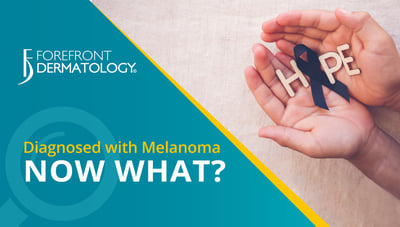
Find it. Treat it. Beat it. May is Melanoma Awareness Month and with summer right around the corner, now is a great time to become more informed about skin cancer.
It’s More Common than You Think
Each year there are more new cases of skin cancer than combined cases of breast, prostate, lung and colon cancer. Research has estimated that one in five Americans will develop skin cancer in their lifetime. According to the American Cancer Society, about 3.3 million basal and squamous cell skin cancers are diagnosed in America each year with an estimated 87,000 new cases of melanoma predicted for 2019.
What is Skin Cancer?
Skin cancer is an abnormal growth of skin cells. It most often develops on areas of the skin exposed to the sun’s rays. Skin cancer affects people of all colors and races, although those with light skin who sunburn easily have a higher risk.
While rare types of skin cancer do exist, there are four main types of skin cancer:
- Basal cell carcinoma (BCC) is the most common type of skin cancer. BCCs frequently develop in people who have fair skin, yet they can occur in people with darker skin. They appear as a flesh-colored, pearl-like bump or a pinkish patch of skin. The can develop after years of frequent sun exposure or indoor tanning; however, they are more commonly due to intermittent high intensity UV exposure (burns), especially childhood exposure. They are commonly found on the head, neck, and arms, yet can form anywhere on the body, including the chest, abdomen, and legs.
- Squamous cell carcinoma (SCC) is the second most common type of skin cancer. SCC often appears as a red firm bump, scaly patch, or a sore that heals and then re-opens. SCC tends to form on skin that gets frequent sun exposure, such as the rim of the ear, face, neck, arms, chest, and back. Early diagnosis and treatment can prevent this and stop SCC from spreading to other areas of the body.
- Melanoma is a deadly form of skin cancer because of its ability of metastasize to local lymph nodes and other organs. It is estimated that melanoma kills, on average, over 10,000 people in the United States every year. It can develop in an existing mole, but is actually more likely to suddenly develop as a new dark spot on the skin. Early diagnosis and treatment are crucial for all forms of skin cancer, but especially melanoma.
- Merkel cell carcinoma (MCC) is a rare form of skin cancer that presents with a rapidly growing, painless, firm, shiny nodule typically on the head and neck region. MCC is more common in fair-skinned individuals, in immunosuppressed patients, and in patients with B cell malignancies. Early identification is critical because these tumors have a propensity for local recurrence and regional lymph node spread.
Get Checked.
Regardless of whether you have noticed an odd or changing mole, a yearly skin examination is always recommended as a preventative measure to skin cancer. The skin health experts at Forefront Dermatology are ready to see you for a simple, 10 minute skin cancer screening. To find the Forefront dermatologist nearest you, visit the locations page today.





